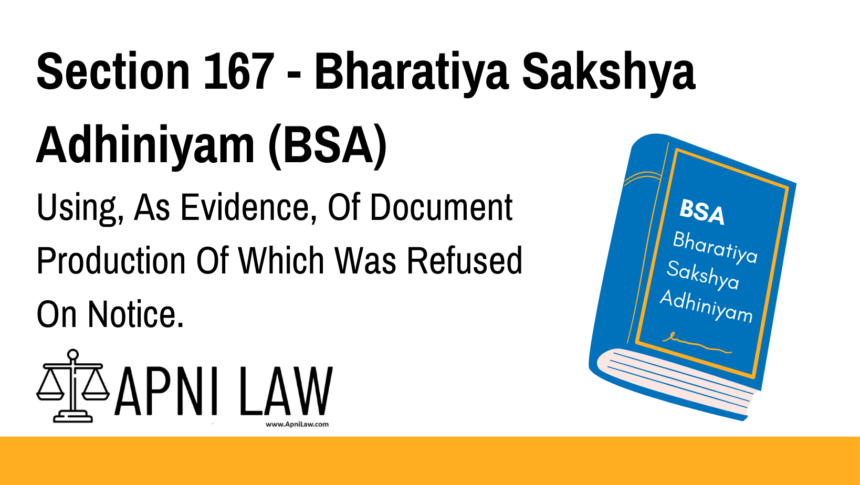Code: Section 167 BSA
When a party refuses to produce a document which he has had notice to produce,
he cannot afterwards use the document as evidence without the consent of the other party
or the order of the Court.
Illustration.
A sues B on an agreement and gives B notice to produce it. At the trial, A calls for the
document and B refuses to produce it. A gives secondary evidence of its contents. B seeks
to produce the document itself to contradict the secondary evidence given by A, or in order
to show that the agreement is not stamped. He cannot do so.
Explanation of Section 167 BSA
Section 167 of the Bharatiya Sakshya Adhiniyam (BSA) establishes that when a party refuses to produce a document in response to a notice, they cannot later use the document as evidence unless they obtain the consent of the opposing party or an order from the Court to do so.
Key Provisions:
- Refusal to Produce Document: When a party is given notice to produce a document and refuses to do so, they are not allowed to introduce that document as evidence at a later stage without permission.
- Court’s Consent or Opposing Party’s Agreement: The party who refused to produce the document must either obtain consent from the other party or seek permission from the Court in order to use the document as evidence.
- Prevention of Withholding Evidence: This provision prevents a party from withholding important documents during trial and then later introducing them in an attempt to contradict the evidence already presented. It ensures that documents cannot be selectively presented or withheld without consequence.
Illustration
Example 1: Commercial Agreement Case
A sues B for breach of contract and requests B to produce the signed agreement. B refuses to produce the document despite being given notice. A proceeds with secondary evidence to prove the agreement’s contents. If B later attempts to introduce the original document to contradict A’s secondary evidence, they are not allowed to do so without permission from the Court.
Example 2: Property Dispute
In a property dispute, Party A asks Party B to produce the title deed. B refuses. A presents secondary evidence regarding the ownership. B later tries to introduce the original deed to challenge A’s evidence. However, B cannot do so unless they obtain either consent from Party A or an order from the Court.
Common Questions and Answers on Section 167 BSA
- Can a party use a document as evidence if they initially refused to produce it?
- No, the party must either get consent from the other party or obtain a Court order to use the document as evidence if they initially refused to produce it.
- What happens if the party refuses to produce the document without a valid reason?
- The party who refuses to produce the document is restricted from using it later in the trial unless they obtain consent or a Court order.
- Can the Court force a party to use a document they refused to produce?
- No, the Court cannot force the party to use the document, but it can order that the document be introduced as evidence if there is a valid reason to do so.
- What does “secondary evidence” mean in this context?
- Secondary evidence refers to evidence that is not the original document but is used to prove the contents of the document, such as copies or oral testimony regarding the document.
Conclusion
Section 167 of the Bharatiya Sakshya Adhiniyam (BSA) plays a critical role in ensuring fairness and transparency in legal proceedings. It prevents parties from selectively presenting documents by prohibiting the use of documents that were previously withheld in response to a notice, unless permission is granted by the Court or the opposing party. This provision helps maintain integrity and accountability in the trial process.
For a deeper understanding of other legal provisions and their applications, visit ApniLaw’s comprehensive legal resources.













